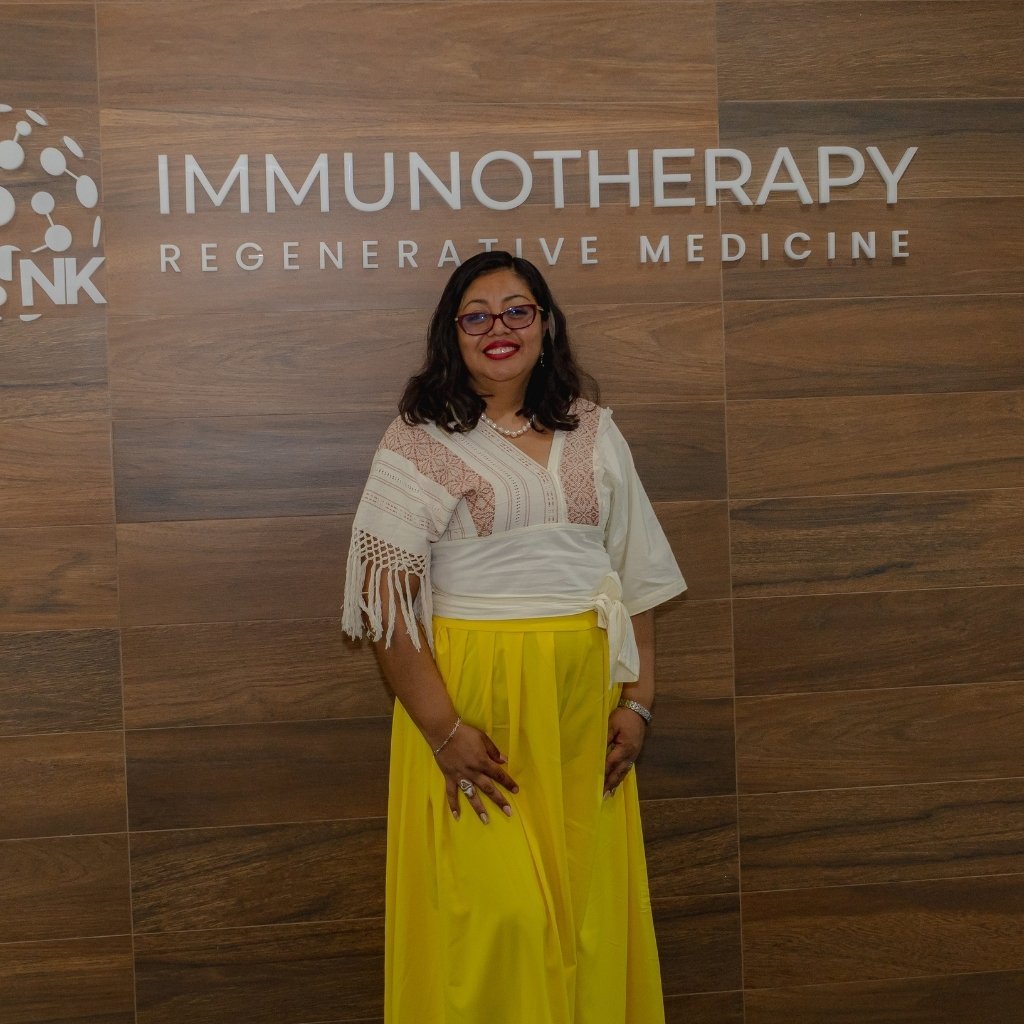Itzen Aguiñiga Sánchez, Ph.D., is a biologist and translational researcher whose work integrates oncology, nutritional biochemistry, and natural‐product pharmacology to identify and validate plant-derived compounds with selective antineoplastic activity. She leads the research line “Antineoplastic activity of plant compounds” within the Hematopoiesis & Leukemia Laboratory at the Research Unit on Cell Differentiation and Cancer (UIDCC), FES Zaragoza – UNAM, where she mentors undergraduate and graduate theses and coordinates collaborations connecting bench discoveries with clinical and public-health questions. She is a Level II member of Mexico’s National System of Researchers (SNI).
Academic background
Dr. Aguiñiga earned a B.Sc. in Biology from FES Zaragoza – UNAM (2008). She then completed a M.Sc. and a Ph.D. in Sciences at the Colegio de Postgraduados (COLPOS). Her graduate work focused on the in vitro antileukemic potential of Sechium spp. extracts (M.Sc.) and the in vivo antitumor effect of selected Sechium genotypes (Ph.D.), forming the basis of later peer-reviewed publications on selective apoptosis in tumor cells.
Roles and affiliations
- Research Lead, “Antineoplastic activity of plant compounds,” Hematopoiesis & Leukemia Laboratory (UIDCC), FES Zaragoza – UNAM.
- Faculty member, Department of Biomedical Sciences / Biology program, FES Zaragoza – UNAM (teaching and thesis direction).
- Collaborator, interdisciplinary projects with botanists and chemists (Colegio de Postgraduados) and clinicians in aging/metabolic health.
Research focus
1) Natural products in oncology (Sechium spp. and other Cucurbitaceae). Dr. Aguiñiga’s team investigates extracts and fractions from Sechium genotypes/hybrids, mapping flavonoids, phenolic acids, and cucurbitacins and testing their tumor-selective cytotoxicity. Her work demonstrated that a Sechium hybrid extract strongly inhibits proliferation of murine myeloid leukemia lines (P388, J774, WEHI-3) with IC₅₀ < 1.3 μg/mL, induces apoptosis (PS externalization, DNA fragmentation), and spares normal bone-marrow cells, providing a clear selectivity signal.
2) Nutrition–cancer interface (milk proteins/caseins). As co-author of a 2024 Medical Oncology review, she synthesized mechanistic evidence showing casein-derived peptides can trigger STAT1-mediated antitumor responses and down-regulate pro-survival pathways (STAT3/HIF-1α, NF-κB), supporting casein as a potential adjunct in cancer therapy.
3) Translational geroscience and metabolic health. In clinical collaborations, she has examined powdered Sechium edule supplementation in older adults with metabolic syndrome, reporting antioxidant/anti-inflammatory effects and improved cardiometabolic markers—work that connects botanical pharmacology with patient-centered outcomes.
Current projects
- Bioactive mapping & standardization. Ongoing profiling of Sechium genotypes (including hybrids such as HD-Víctor and nigrum spinosum) to relate chemical fingerprints to biological readouts (apoptosis vs. non-tumor cytotoxicity), and to explore microencapsulation/delivery routes that preserve labile metabolites.
- Mechanisms of selectivity. Dissecting mitochondrial and death-receptor pathways in tumor vs. normal hematopoietic cells to explain selective apoptosis induced by plant extracts and their enriched fractions.
- Nutrition-oncology synthesis. Following the 2024 casein review, her group is prioritizing bench-to-preclinical studies on casein-derived peptides as low-toxicity adjuncts, focusing on signal transduction and immune modulation.
- Academic mentorship. Active direction of theses on DNA fragmentation assays, drug-resistance in AML (HL-60), and hepatoprotective effects of Sechium hybrids—reinforcing training in methods such as flow cytometry, Annexin V assays, and comet assay.
Selected publications
- Fruit extract from a Sechium edule hybrid induces apoptosis in leukemic cell lines but not in normal cells. Nutrition and Cancer 2015;67(2):250–257.
PubMed: https://pubmed.ncbi.nlm.nih.gov/25611564/ PubMed - Chemical analyses and in vitro and in vivo toxicity of fruit extracts from a Sechium edule hybrid. Food & Chemical Toxicology 2017;109(Pt 2):954–967.
PMC review article citing this work: https://pmc.ncbi.nlm.nih.gov/articles/PMC6130647/ PMC - Antioxidant and anti-inflammatory effect of powdered Sechium edule var. nigrum spinosum in Mexican older adults with metabolic syndrome. Antioxidants 2022;11(6):1076.
Article: https://www.mdpi.com/2076-3921/11/6/1076 MDPI - Anti-cancer potential of casein and its derivatives: novel strategies for cancer treatment. Medical Oncology 2024;41(8):200.
PubMed/PMC: https://pubmed.ncbi.nlm.nih.gov/38990440/ (open access: PMC11239739) PubMed - The consumption of Sechium edule has antioxidant effect and prevents telomere attrition in older adults with metabolic syndrome. Nutrients 2023;15(10):2269.
PMC: https://pmc.ncbi.nlm.nih.gov/articles/PMC10165935/ PMC - Fruit extract of Sechium chinantlense induces apoptosis in HeLa cells. Nutrients 2023;15(3):667.
Article: https://www.mdpi.com/2072-6643/15/3/667 (authors include Aguiñiga-Sánchez) MDPI
Additional indexing/affiliation resources: ORCID profile for Itzen Aguiñiga-Sánchez (UIDCC–FES Zaragoza); UNAM laboratory pages listing her as the lead for the plant-derived antineoplastic line.
Recognitions
Dr. Aguiñiga is a Level II member of SNI (CONAHCYT) and has served as faculty/mentor at FES Zaragoza – UNAM, directing theses and laboratory lines within the UIDCC’s Hematopoiesis & Leukemia Laboratory. These roles reflect sustained peer recognition and institutional trust in both her scientific leadership and student training
